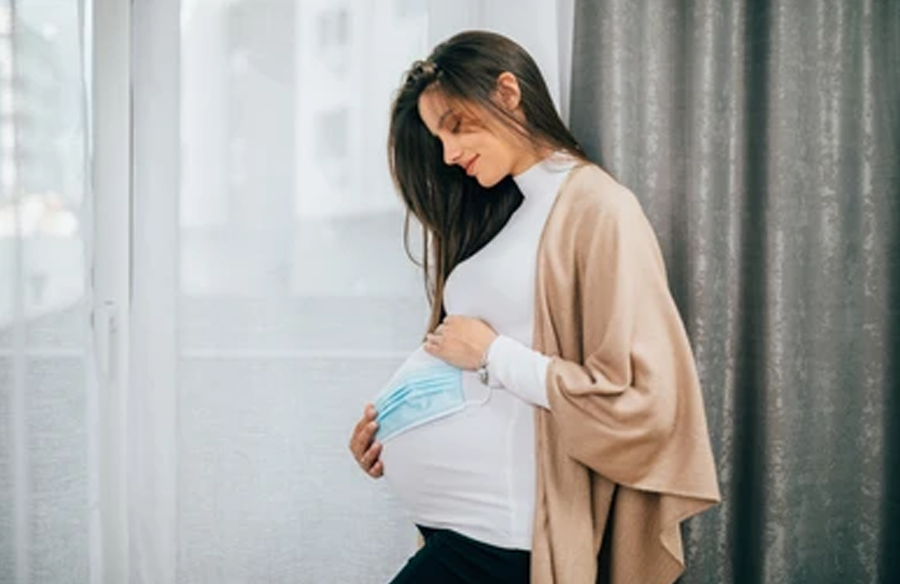Blogs
Pregnancy During Covid-19 Pandemic? Time To Be Cautious More Than Ever

Out of the many wonders gifted by the almighty, pregnancy is one of the most blissful and awe-inspiring phenomena!
We understand that a million questions revolving around pregnancy, childbirth, and health keep all mothers-to-be on their toes. But no women before the year 2020 ever had to face the question - "What if I catch covid-19? or Can my baby catch Covid from me?"
Yes, such questions are raging inside every woman who is pregnant, planning to conceive or is about to give birth.
Although the medical fraternity is still researching for actual effects of the virus on pregnancy and newborn child. But after a year and a catastrophic second wave of the pandemic, the outcome of early scientific studies about the virus can help us adapt better and keep ourselves safe through pregnancy.
Understanding Things About Pregnancy and Covid-19
1. Pregnancy is a delicate affair. Taking care of your health is a priority. Hence catching the Covid-19 infection is overall less due to the precautions one takes. But keeping safe is paramount as pregnancy changes reduce the immunity of the body.
2. Pregnant women are more likely to develop a severe illness like respiratory distress and require intensive care to avoid further complications and deterioration of health than non-pregnant person.
3. The chances of pregnancy complications are higher if you catch Covid-19 during pregnancy (or upto 42 days after pregnancy ends), as Covid-19 is a new virus. Not much is known about how it affects pregnant women. But based on the small sample studies conducted till now, the virus can induce complications such as pre-term birth, pre-eclampsia, admission to intensive care, and the need for a respiratory support system and ventilator in pregnant women.
4. In most pregnant Women - Mild to moderate flu-like symptoms of Covid-19 retreat in 5-6 days. But strict monitoring of vitals such as oxygen levels, fever, heart rate and continuous guidance of your gynaecologist is needed. You should not self-medicate.
5. It is still unsure why and how do newborns catch the infection. So the safest bet is to take complete precautions throughout pregnancy, especially in the third trimester, so that the pregnant woman does not contract the virus at all.
6. Certain pre-existing health conditions such as obesity, hypertension, diabetes raise the risk of getting severely ill with Covid-19 during pregnancy.
How to Reduce Risk of Covid-19 During Pregnancy
1. Vaccination - Multiple vaccines have rolled out for everyone above the age of 18 years. The first step towards protection is getting your family and people around you (such as staff, house help) vaccinated. The efficacy and effects of the vaccine on pregnant women are still under discussion. Until then, creating a herd immunity around a pregnant woman by vaccinating everyone is a much efficient way to stay safe.
2. Staying Indoors - Of course, pregnancy is not an illness, and you can go about as usual, if not expressly prohibited by the doctor, with slight lifestyle changes. However, this concept has been shaken with the arrival of Covid-19. We are on the way to discovering more and more about the virus, but the road is long. Therefore, unless necessary, stay indoors because even after all the precautions, there is no way to have zero risk of infection due to its high transmissibility. Try to have things delivered at home rather than stepping out.
3. Controlled Social Interaction - If you are employed during pregnancy, refrain from any social interaction at work as much as possible. Talk to your employer and ask for a separate cabin or option to WFH. If the need to interact at the workplace is unavoidable, always maintain a distance of atleast six feet, do not entertain anyone who is not wearing a mask. One can also get a transparent partition on the table to stop the chance of direct airborne transmission if the distance is less than six feet. It is prudent to avoid any social gathering, as you can never know if anyone is asymptomatically infected and may pass on the infection to a healthy person.
4. Boosting Immunity - Taking prenatal vitamins is essential during pregnancy as it prevents many neurological deformities in foetus during pregnancy or after birth. These prenatal vitamins are not only required for good fetal health but also improve the immunity of the expectant mother as well. Eating the right food, balancing nutrition, taking multivitamins and staying hydrated is vital to keep your immune system strong. Immunity boosting is also necessary to avoid any type of illness other than Covid-19 and cause unnecessary hospital visits in the current times. Seasonal fruits are seasonal for a reason, and
5. Be physically active - Endorphines are the "Happy" hormones released when a person exercises, dances, walks or does any other physical activity. Exercising is good for overall health and boosting the immune system. Most pregnant women are advised to do atleast brisk walking to keep themselves physically charged. Expectant mothers involved in a high-intensity workout before pregnancy can continue low-intensity exercises if permitted by their doctor. If you live in a place that has a place to walk in the open, you should do it regularly (Social distancing to be maintained at all times). If you have no space outside, stride in the house, as walking in public places is not safe currently. A proper activity and movement helps to manage blood pressure, keeps you calm and stress-free.
6. Masking, Washing and Sanitizing - The Protocol for masking, washing hands and sanitizing to be followed strictly at all times and by the other people around, including family members and staff.
What to do if you Covid-19 during Pregnancy
1. If you have any symptoms or if you are not well or have come in contact with anyone who is Covid positive, get yourself tested immediately.
2. Do not self medicate, or rely on social media for advice. Consult a medical expert immediately.
3. Isolate yourself and measure your vitals like temperature and oxygen levels as many times as suggested by your doctor.
4. Take your multivitamin, stay hydrated, do yoga or light breathing exercise without exerting yourself.
5. Keep in touch with your family and friends through video calls.
6. If you have mild or no symptoms, you may be asked to isolate at home. For moderate to severe symptoms, hospitalization is a must.
7. Avoid over-stressing and panicking as it decreases your body’s immune response.
8. Keep in touch with your consulting doctor and keep them updated about your health twice a day.
IF YOUR SYMPTOMS WORSEN CALL YOUR DOCTOR IMMEDIATELY.
Know what has changed about Prenatal Checkups, Delivery Process, and Postnatal Care
1. Prenatal Checkups - The picture of prenatal visits and checkups have changed, adapting to the current Covid-19 situations.
• The doctors will call for an in-person checkup only at various intervals, at every trimester, such as sonography, screening tests or tetanus vaccines. For other scheduled checkups, an online consultation will be done.
• This is good for your own safety, as going to the clinics frequently raises the chance of getting infected.
• If it is high-risk pregnancy such as multiple pregnancies, or placenta previa, virtual consultation might not be an option. You should discuss safe in-person safety measures with your gynaecologist.
• You can ask your doctor for vital monitoring tools that can be used at home like blood pressure, oxygen levels, glucose meter, weighing machine.
• It is also advisable to keep your questions and observations written and handy while your virtual checkup appointment to get proper guidance and all doubts answered.
2. Delivery or Childbirth - The stressing question - how will the coronavirus change the situation during the hospital stay and afterwards? The delivery process has also changed to keep the expectant mother and the baby safe, during and after childbirth.
• If you go into labour and have a natural delivery, your doctor might not have the time to do a covid test before. However, they will still take the sample during the process.
• If you're induced or planned for c-sec, the doctor will suggest a covid test 72 hours before admission to the hospital.
• Please confirm covid protocol with your gynaecologist at the start of the third trimester. Most maternity hospitals do not admit covid positive women for delivery to keep the environment safe for non-covid mothers and babies. Either they will refer you to another medical facility, or you might have to find one. So knowing the protocols beforehand will help you be prepared for the change of hospital or doctor if required at the last moment (In case you test positive just before delivery).
If you are covid negative - What to expect?
• Once you have the little one in your arms, maintaining social distance and no-visitor policy during and after the hospital stay is the prudent thing to do in the current times. With masking, sanitizing protocols to be followed at all times.
• In current times most hospitals do not allow more than one person to stay with the new mother. You should also get the person/caretaker staying with the new mother to get their covid test done for optimum safety.
• Even after discharge from the hospital, strictly ask the relatives and friends to not come over to meet, as keeping the baby safe from infection is extremely important given the current situation.
• Even if you test negative, continue wearing the mask at all times to prevent catching infection later and wash hands every time before you nurse the baby.
If you are covid positive - what to expect?
• Unfortunately, if you are Covid positive at the time of delivery, be mentally prepared for isolation during your hospital stay and homestay. Your baby might be kept in a special care unit, away from you until your recovery. No care/taker or family member will be allowed to stay with you. Rest assured the medical team will take the best care of you and your baby!
• If your baby is also tested positive, you will be allowed to stay in the same room and even breastfeed. In this case, always wear a mask and wash hands before and after touching the baby. Do not stress as most newborns have mild or no symptoms at all and recover very soon.
• The baby will be kept at a distance in a cot when not nursing. It is beneficial for the baby and for you to get some rest and recover.
• This might be a heartbreaking thing, but remember, you have passed through the miracle of birth. Keep Calm and follow the instructions of your healthcare provider.
The prenatal journey is exciting and fulfilling. Staying calm and keeping yourself stress-free is very important for your and the baby's health.
The responsibility to keep the little one safe increases manifold once you come home. Discuss online postnatal checkup options with your Gynaecologist and Paediatrician.
In such dire times, constant anxiety for the health of the newborn and family is obvious. Hence it is even more important to keep a check on your mental health. Talk to your doctor about any depressive thoughts and it is hindering in taking care of yourself and the newborn as it might be postpartum depression. Read our Postpartum Depression blog for more information.
If you are planning to conceive, it will be a reasonable step to get vaccinated against covid-19 to safeguard your pregnancy journey.
Being positive and stress-free is even more imperative in these desperate times, for maintaining good health and it is crucial to take all possible care and be cautious as the pandemic is not yet over.
Love this blog? Share it with other parents.





